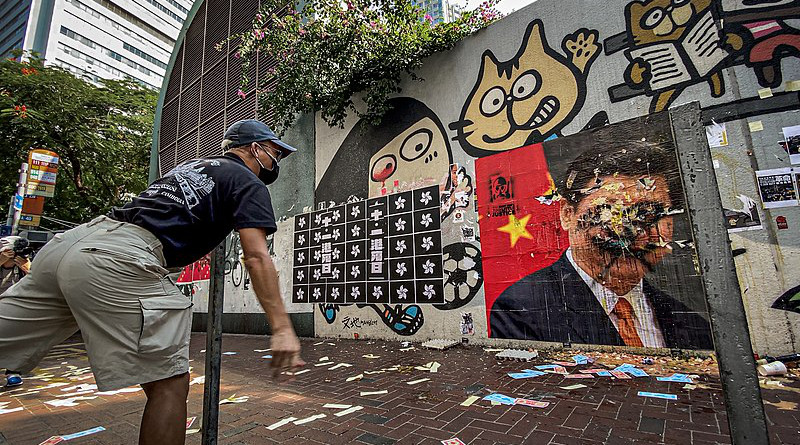Hong Kong: Judicial Repression Becomes The Norm – Analysis
By Eric Lai*
On 26 September 2022, a university professor, two former lawmakers, a Cantopop singer and a Catholic cardinal were charged by the Hong Kong government for failing to register a humanitarian aid fund with the police. The five defendants — 90-year-old Cardinal Joseph Zen, singer Denise Ho, cultural studies professor Po-Keung Hui and former lawmakers Margaret Ng and Cyd Ho — are well-known supporters of the pro-democracy movement in Hong Kong.
The five founded the 612 Humanitarian Relief Fund in 2019 to assist protestors who faced financial difficulties in seeking legal and medical assistance during the six-month-long anti-extradition bill movement. The Fund also sponsored various civil society activities, including peaceful rallies and international advocacy. Drawing on continuous popular support via crowdfunding, the Fund has aided more than 14,000 protestors and civilians involved in the 2019 movement.
The Fund decided to cease operation in late 2021 under political pressure from the National Security Law (NSL), which was enacted and imposed on Hong Kong by Beijing in 2020. The five defendants, who serve as the Fund’s trustees, are now under investigation by the national security police for allegedly colluding with foreign forces.
Judicial repression has become the norm since the NSL was enacted two years ago. The law introduced four offences — secession, subversion, terrorist acts and foreign collusion. These categories are defined broadly and can be applied to target many non-violent civil society activities. The NSL can be considered a reprisal for persistent support for anti-authoritarian protests, pro-democracy primaries, international lobbying and general labour strikes during the anti-extradition law protests.
In the past two years, the NSL and other draconian laws — including the 2019 revival of the offence of sedition — have been used by the local government to arrest and charge more than 200 citizens. This includes former lawmakers, political activists, journalists, scholars, high school students and ordinary citizens. More than half of those arrested have been denied bail and have been pending trial for more than one year.
Over 10,000 citizens were arrested in the anti-extradition bill movement and more than 2000 protestors — who are now regarded as political prisoners — have been imprisoned for years.
Although Hong Kong had earned global recognition for the quality of its rule of law and independent courts, many draconian laws remain on the books. These laws now serve as tools of repression. The government is reviving numerous colonial laws to punish peaceful activists and unionists for making public anti-government speeches and publishing works that are labelled as seditious.
The NSL has weakened judicial independence in Hong Kong in several ways. The Chief Executive of Hong Kong can now handpick judges to handle national security cases without prior consultation with the Chief Justice. The Secretary for Justice, who serves as the head of public prosecution, can remove the jury bench from a national security trial without the court’s approval. National security defendants in the Hong Kong court can be tried secretly or sent to mainland China for trial upon the Chinese national security agency’s request.
The Basic Law, which serves as a mini-constitutional document maintaining Hong Kong’s ‘One Country, Two Systems’ policy, mandates that international human rights treaties remain in effect and that local courts enjoy the power of judicial review. But the China-imposed NSL can now be used to override local laws. The central government has been able to overrule local court rulings by issuing binding interpretations of the Basic Law, weakening the capacity of local courts to safeguard individual freedoms and fundamental rights.
There seems to be no end to such judicial repression as both Beijing and Hong Kong authorities appear to be continuing their strategy. Arrests and prosecutions of political dissidents in Hong Kong continue and the dates of many national security trials remain unknown. As long as political prisoners are remanded or kept in jail, the government can continue to weaken the capacity of civil society. As of 2022, more than 100 civil society organisations and trade unions have been dissolved or closed under the threat of the NSL.
The NSL has also reshaped local courts, which no longer safeguard international human rights and fair trials. In November 2021, local courts sentenced 31-year-old activist Ma Chun Man to jail for five years and nine months for inciting secession for merely making public speeches. The courts also sponsor judicial repression by denying bail to national security defendants and imposing heavy punishments on political dissidents.
In early 2022, two British judges resigned from their positions on Hong Kong’s top court, criticising the state of civil liberties and rule of law in light of the NSL. Their departure marked a new era for Hong Kong, 25 years after its handover from British rule. The more the Chinese and Hong Kong authorities politicise local courts, the less possible it will be for them to maintain public and global confidence in Hong Kong’s legal system — and the city’s future under China’s shadow.
*About the author: Eric Lai is a non-resident Fellow at Center for Asian Law of Georgetown University Law Center, and a scholar in Law, Politics and Human Rights in Hong Kong & China.
Source: This article was published by East Asia Forum

